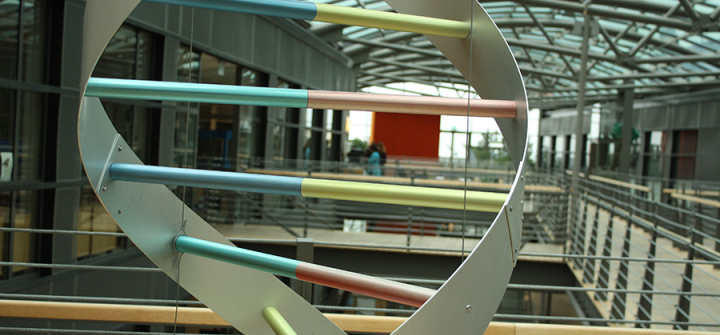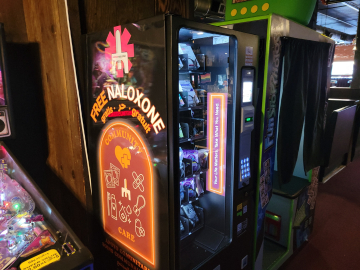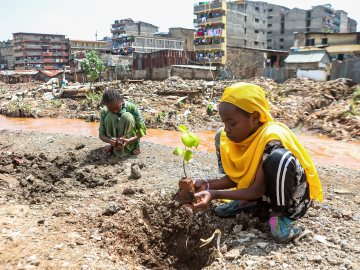The Right Not to Know: When Ignorance is Bliss but Deadly
Withholding information about potentially life threatening but preventable risks seems to directly contradict the Hippocratic oath to do no harm—but pushing unwanted information on people can also cause harm. How can we reconcile the right not to know and the right to live?
REYKJAVÍK—It was her first day of summer vacation in 2015. Erna Ingibergsdóttir was lounging in her home in Iceland, watching her 2 youngest children play, when the phone rang. It was about the lump in her breast.
“I was so sure it was nothing,” she says. “Then the woman who called wanted me to come in to receive the results.”
Ingibergsdóttir refused. The woman would have to tell her over the phone. Two weeks later, she had a double mastectomy.
With her Pollyanna outlook, Ingibergsdóttir is positive almost to a fault. When she announced the bad news to a friend she was quick to add the good news—that now she could get “bombshell boobs!” Even so, she admits that the treatment took a huge toll on her. Looking out the window of a downtown Reykjavík coffee shop, 2 years after her diagnosis, the 47-year-old’s ever-present smile seems to fade from her eyes.
“I was really, really sick,” she said, the right side of her lips twitching upward. “Chemo was hard; I don’t recommend it.”
In most instances, such illnesses can’t be prevented. But odds are, Ingibergsdóttir’s cancer could have been avoided if it weren’t for a long-held paradigm in medical ethics: The right not to know.
Ingibergsdóttir is one of approximately 2,400 Icelanders with a BRCA2 gene mutation. That’s 0.8% of the small island nation. The mutation, like the BRCA1 gene mutation made famous by Angelina Jolie’s Op-Ed in The New York Times, has been linked to a sharply increased risk in breast and ovarian cancer for women and prostate cancer for men.
Women with the BRCA2 mutation average a 69% risk of breast cancer and for some, depending on family history, the risk may be above 80%. The somewhat good news is that the risk can be reduced by approximately 90% with preventive surgeries, like Jolie’s radical mastectomy. Ingibergsdóttir never had that option.
The Icelandic government offers a relatively accessible genetic counselling service. But except for a single known relative, Ingibergsdóttir’s family doesn’t have a history of breast cancer, so she never got tested. How could she have known?
In the US, one in every 500 women carry BRCA1 or BRCA2 mutations. Collecting the data to find all of them would be an enormous task. But in Iceland, the work has technically already been done. Biopharmaceutical company DeCode Genetics says it has collected full DNA sequences of enough individuals to accurately guess the DNA makeup of almost all Icelanders, a nation of roughly 340,000. Through the ages, Icelanders have kept obsessive genealogical records and most can trace their lineage back to common ancestors. The pairing of these records with the DNA sequences in DeCode’s encrypted data means that it includes information about all possible BRCA mutation carriers, even those who have never undergone genetic testing or participated in the company’s studies.
Since 2013, DeCode’s CEO Kári Stefánsson has been fighting to circumvent the right not to know, which in Iceland is written into law. He wants to “push the button” and uncover the identities of every BRCA carrier in the country. He believes that when it comes to saving lives, laws should be broken; every person who has the gene mutation should be informed.
“If someone goes missing in the highlands we send search parties of a few hundred to look for them,” he says. “We do this without asking their permission. We are infringing on their right to be left alone just as much as if we try to save the lives of people with these mutations.”
Stefánsson says he isn’t opposed to the right not to know. He just thinks the right to live is more important.
“I’d argue that this is a bit foolish, a bit vicious,” he says. “You just don’t let people die young if you can help it, period!”
Many people see it this way—but remarkably, Ingibergsdóttir isn’t necessarily one of them. While most of her extended family has now undergone genetic testing for BRCA2, there are still some who don’t want to know yet, or ever. Among them: her 23-year-old daughter, whose paternal grandmother also carries the mutation.
Ingibergsdóttir doesn’t want to pressure her daughter. After all, she is still young and the information will influence all her major life decisions from here on out.
“If I would have known, I’m not sure I would have had my two younger children,” she says. “I don’t want to spread this on. I feel guilty, as a mother.”
Vigdís Stefánsdóttir, a genetic counsellor at Iceland’s National University Hospital, has seen people from known BRCA2 families come in for diagnosis as late as 20 years after the mutation was discovered. She has many folders in her drawer with information about people who have come in but never completed the process. Sometimes, she will repeatedly call people with the results from their blood test without ever reaching them.
“Then I let it go and put the folder in the drawer,” she says. “Because then I know that the counselee isn’t ready to know the result.”
There are many reasons why a person would back out, Stefánsdóttir says. Knowing what our genes predict can save lives, but it can also lead to a lifetime of worry and mental health issues as carriers wait for the other shoe to drop. She says only the counselee can decide when the timing is right.
“The rule is that the less you can do about a disease, the fewer people want to know if they are at risk. Like with Alzheimer’s: Every time you forget something, forget your keys somewhere – hold on, have the symptoms started? It is similar BRCA. If I feel a stab of pain in my breast, is this the first sign of breast cancer?”
She says the information changes people—and once learned, it can’t be taken back.
“I don’t like to talk about the right not to know,” she says. “This is the right to know when it’s right for you.”
This rings especially true for Íris Katrín Barkardóttir, who is 31 and waited almost a decade to go in for a BRCA2 diagnosis. Her mother, who died from cancer in March 2011, had told her about the mutation’s existence when Barkardóttir was 20 years old. They both decided that they didn’t want to know.
“To be alive is deadly, and if you are always thinking ‘what if,’ then you are stuck in a cycle of angst,” she says. “As someone who suffers from anxiety I try to shut these thoughts out, but of course they appear.”
Sitting in her bright kitchen in Reykjavík’s Laugardalur district, Barkardóttir lovingly strokes a tiny white puppy in her lap, comforting herself as much as the dog as she tells her story.
She watched her mother go through one agonizing chemotherapy and radiation treatment after another, at one point losing the skin of her hands and feet. The experience took a mental toll and the idea that she herself might have to go through that was too hard to live with. The right not to know felt more important than knowing.
However, Barkardóttir would come to have a momentary change of heart. She was 29 when she finally got tested and it took a while for her to schedule her first breast exam. When the image from the MRI machine showed a shadow on her breast, she broke down in tears.
“I cried for 24 hours straight,” she says. “I felt like a ticking time bomb.”
She was convinced that she would die and was consumed with regret. Why didn’t she get checked earlier? She was scheduled for further exams the next week but pleaded with medical staff at the screening service to move her appointment up to the following day.
In the end, the shadow proved to be a false alarm.
Barkardóttir intends to have a preventive mastectomy and will also consider an oophorectomy (surgical removal of her ovaries) later in life. During the period when she thought it was too late, she would have liked for someone to have forced the information on her, but today she is happy that she got to control the timing.
“I went through some hard times after my mom died and I couldn’t have had this hellish cloud chasing me then,” she says. “This is something that demands mental maturity. It was crucial that I didn’t know earlier.”
Of course, it’s easy for Barkardóttir to say this now. By not knowing, she saved herself a decade of tense breast exams and languorous fear. But what is living in fear or undergoing potentially unnecessary surgeries compared to not living at all? What about those who don’t get to know until it’s too late?
A governmental committee has been working on a middle ground.
“The group agrees that the rights of those who don’t want to know—a position that is very important to respect—can’t stand in the way of those who both need and want to know,” says committee chairman, Sigurður Guðmundsson, MD, adding that resolving the issue is of the utmost importance.
“Presumed consent has been discussed quite a bit, but it’s been pointed out to us that any perceivable paths would in all probability contradict privacy laws—and the constitution.”
Therefore, the committee has sought other ways to bridge the gap and in fact, according to Guðmundsson, a solution involving a national health portal seems to be in sight.
Genetic information from science studies, such as information on BRCA carriers, could be unencrypted and uploaded to the portal where users can access their medical records. Today, one of the main concerns is for those who don’t know that they should get checked, but the portal would put that suggestion front and center. Instead of having to seek the answers out at a medical facility, users could unlock their expected BRCA status and directions on how to proceed with one click.
The idea has its flaws. For one, receiving bad news in person from a health professional is preferable to reading it online, regardless of the counseling material provided. It does, however, solve the issue of interference and gives power to the individual.
“It also has to be made possible for researchers to provide this kind of information to those participants who wish to have it,” Guðmundsson says. Regardless of how the information is received, he says the individual should always be directed to see a counselor for further diagnosis. “There are other possible approaches but probably none that are better.”
Stefánsdóttir agrees. If society decides that it does in fact want researchers to inform individuals of individual health risks whenever they come across them, she says, a system should be in place, not only because of the right not to know but also for logistical reasons.
“This system – where it can be used – is good in the way that it allows each individual to decide where and when and under which circumstances they access this information,” she says, adding that consistently uncovering new information is in the nature of research.
“You can’t expect researchers to contact every participant each time that happens.”
Anna Marsibil Clausen is an Icelandic journalist based in California, and a Pulitzer Center on Crisis Reporting Student Fellow (Read more about her work with the Pulitzer Center here). She’s a student at the UC Berkeley Graduate School of Journalism where she’s focusing on audio production.
Join the tens of thousands of subscribers who rely on Global Health NOW summaries and exclusive articles for the latest public health news. Sign up for our free weekday enewsletter, and please share the link with friends and colleagues: http://www.globalhealthnow.org/subscribe.html
A DNA sculpture in deCODE Genetics Reykjavik headquarters. The company says it has all the information needed to accurately identify almost every single BRCA mutation carrier in Iceland. Image by Anna M. Clausen




